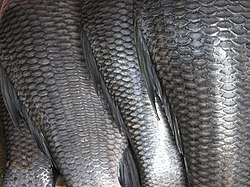- v50 information can now be added to pages in the main namespace. v0.47 information can still be found in the DF2014 namespace. See here for more details on the new versioning policy.
- Use this page to report any issues related to the migration.
Skin
v53.10 · v0.47.05 This article is about the current version of DF.Note that some content may still need to be updated. |
- This article refers to "hide" in terms of the skin of a creature, for the article on hiding items and buildings, see Hide Items or Buildings.
Skin is a tissue layer common to most creatures. Different types of creatures have different types of skin.
- Most mundane creatures have raw hide, which displays in-game as skin. This is the only type that can be tanned into leather.
- Arthropod creatures have untannable chitin. Much tougher than normal skin, chitin serves as the skeleton of most creatures that have it, meaning damage immediately affects structural function.
- Reptilian creatures and fish generally have untannable scales. Somewhat tougher than ordinary skin, scales slightly reduce damage from weaker sources.
Skins (both fresh and rotten) are stored in a refuse stockpile under the names "fresh raw hide" and "rotten raw hide" respectively in the stockpile menu. Each butchering job produces a single skin, but tanning a hide may produce multiple pieces of leather, depending on the creature's size.
Skin uses[edit]
Raw skin can be processed at a tanner's shop by a dwarf with the tanning labor enabled in order to produce leather, or a dwarf with the tanner labor enabled can bring a skin and a bucket of milk of lime to a tanner's shop to produce a sheet of parchment. Skins are automatically tanned if the "Auto tan" order is enabled. If skins are not tanned automatically, you can use your manager to automatically queue "Tan a Hide" jobs, or manually queue jobs from a tanner's shop. Scales and chitin cannot be tanned (aside from shenanigans being done).
Leather[edit]
Leather can be used to make clothing and low-grade armor. Leather is also used to make bags, waterskins, clothing, shields, armor, crafts and decorations, among other items. It is, practically speaking, the only material to produce quivers and backpacks, at least early in a fortress. The process of making and using leather is part of the meat industry, rather than the clothing industry.
Modding scales to be usable in leatherworking[edit]
| This page includes mods. The content is not part of normal DF as released. Changing game files can sometimes cause unexpected results, and should always be done with care and caution. |
If you want to make items out of scale or chitin, add these tokens to SCALE_TEMPLATE or CHITIN_TEMPLATE in material_template_default.txt in the game raws:
[LEATHER] [ITEMS_LEATHER] [BUTCHER_SPECIAL:SKIN_TANNED:NONE]
This will make butchering yield several sheets of the creature's scale that are usable in leatherworking, instead of regular unusable scales.
Gallery[edit]
See also[edit]
"Skin" in other Languages
|
| More: Gems • Metals • Stones | |
| Creature | |
| Plant | |
| Creature/Plant |
Alcohol • Cloth/Thread • Extract (Golden salve • Gnomeblight • Honey • Royal jelly • Syrup • Venom) • Glob • Liquids • Soap |
| Inorganic |
Metal • Milk of lime • Soil (Clay • Sand) • Stone (Ash glaze • Earthenware • Gem • Gypsum plaster • Porcelain • Quicklime • Stoneware • Tin glaze) |
| Hardcoded | |
| Glitch | |
| See also: Material science | |



